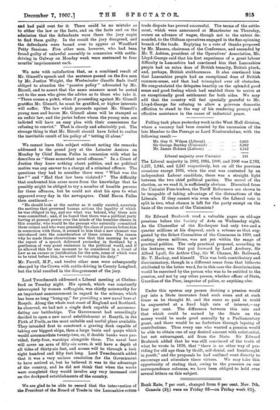We cannot leave this subject without noting the remarks addressed
to the grand jury at the Leinster Assizes on Monday by Chief Baron Palles in connexion with what he describes as "these somewhat novel offences." In a Court of Justice they knew nothing about politics, and no political motive was any answer to a charge of a criminal offence. The questions they bad to consider there were " What was the law ? " and " Had that law been violated? " The difficulty that confronted him arose more from the knowledge that he possibly might be obliged to try a number of humble persons for these offences, but he could not shut his eyes to what appeared every day in the newspapers. Chief Baron Palles then continued :—
"He should look at the matter as it really existed, ascertain the motives that governed human actions the legality of which he was obliged to try, and see what was behind, why these acts were committed ; and, if he found that there was a political party having at present power over the minds of the humbler classes in this country, who would be the persons who naturally committed these crimes and who were generally the class of persons before him in connexion with them, it seemed to him that a new element was introduced into the consideration of these crimes. The reason why he made those observations was that this morning he saw the report of a speech delivered yesterday in Scotland by a gentleman of very great eminence in the political world, and if he allowed this for one moment to be considered in a Court of Law as an excuse or justification for the acts, some of which were to be tried before him, he would be violating his duty."
Mr. Farrell, M.P., and twelve other men were subsequently charged by the Crown with cattle-driving in County Longford, but the trial resulted in the disagreement of the jury.










































































 Previous page
Previous page